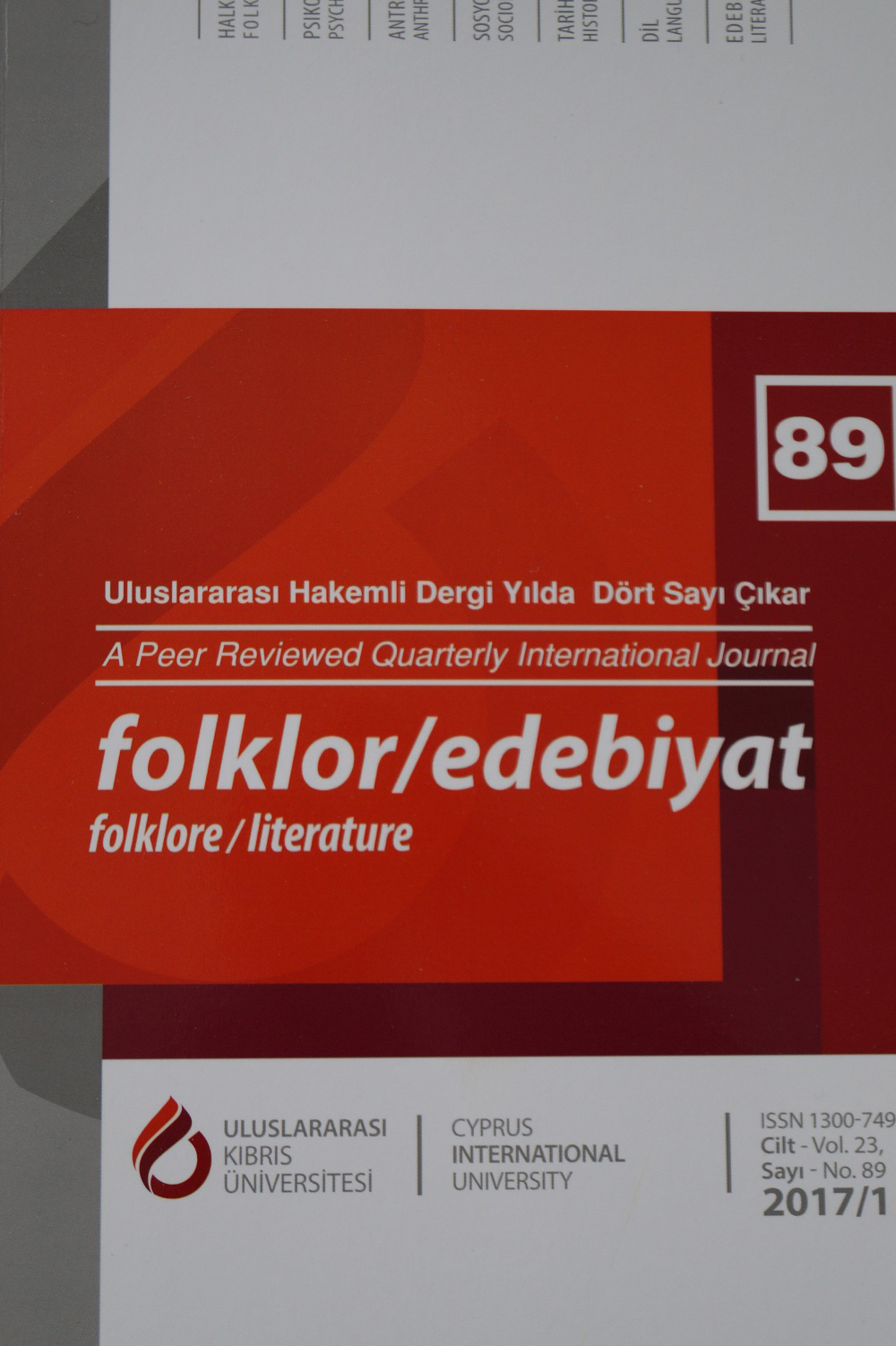
JOURNAL OF FOLKLORE/LITERATURE
Cyprus International University
DOI: 10.5897/UJ-FOLKLORE
Email: folkloredebiyat@ciu.edu.tr
ANALYSIS OF HALE SEvAL’S STORY BOOK KIRILGAN KULELER FROM THE POINT OF THE SOCIOLOGY OF LITERATURE
DOI: 10.5897/UJ-FOLKLORE.17.006.1 | Article Number: 49BA8A716 | Vol.89 (1) - January 2017
Author: Erdoğan Türkan
Keywords: the empathy method, culture, literary sociology, Hâle Seval, Short Story
In this article, Hâle Seval’s storybook, Kırılgan Kuleler, published in 2003, is analyzed from the point of sociology of literature. Being among female writers making a great effort in different narrative types such discussion, review and short story, Hâle Seval is one of major contemporary representatives of the modernist-storytelling tradition. The empathy method is used in present study conducting a thematic analysis.
In literary texts enriched in mesh with fiction, aesthetic and real elements, presence of an understanding of storytelling based on human and natural philosophy comes to forefront. Considering Seval’s stories written in the style of modern short stories, society as a phenome- non in her understanding is not a field of collective representations and symbols developed or produced by the intellectual mind. Like the individual, society also takes on meaning within the natural environment. In author’s sense of reality, natural environment-social environmen- tal/social structure exhibit a nested organic correlation. Evaluating heroes/people with their psycho-social and cultural elements, the author calls attention to the impact of social factors on the individual. We may remark that the author often uses ethnographic, historical, cultural and geographical elements in her stories. In this context, analyzing both the sense of authors- hip identity and thematic content of stories, we can highlight that Hâle Seval’s stories have pioneered in becoming significant examples of the literary type, also called “documentary story” from the point of the history of story in Turkey.
Analyzing in terms of sociology, it is possible to remark that the author discusses various themes along with rich content in her stories. These themes in general can be listed as fol- lows: the relationship between individual’s lifestyle with the city phenomenon; gender-based differentiation, discrimination-exclusion formats from the point of women’s class positions; fragmentations and contradictions in individual’s subjective world created by distinct charac- teristics and experiences peculiar to urban and rural structure; different types of children cre- ated by layers of poverty; reflection and experience types of love and sexuality understanding in subjective world and outer-social world; effects of psycho-social and cultural aspects of the migration phenomenon on individual’s life, alienation; philosophical-sociological breaks created in individual’s lifestyle by the ethnicity-induced migration.
Sequence of stories and their section titles symbolize a journey from outer reality to- wards subjective reality, in which reality is gradually exceeded, and a journey towards the author’s world view and artistic information layers relating to the existence.
Ayan, D. (5 Ağustos 2010). Hâle Seval, Duvarsız Avlu: Bozcaada. Cumhuriyet Gazetesi- Kitap Eki, s.13.
------ (2011). Hâle Seval’in ‘Duvarsız Avlu: Bozcaada’ Kitabı Üzerine. Frankofoni, (23), s.75-84.
Butor, M. (1991). Roman Üstüne Denemeler, (Çev. M. Rifat ve S. Rifat, Çev.). İstanbul: Düzlem Yayınları.
İnal, T. (2006). Bir Okuma Önerisi Olarak Empati Yöntemi. Frankofoni, (18), 3-26. Kemerlioğlu, E. (1996). Toplumsal Tabakalaşma ve Hareketlilik. İzmir: Saray Kitabevleri. Kinloch, G.C. (2014). Sosyolojik Teori, Gelişmesi ve Belli Başlı Paradigmalar (T. Günşen
İçli ve D. Ayan, Çev.). Ankara: Birleşik Dağıtım. T.y.
Kongar, E. (2007). Toplumsal Değişme Kuramları ve Türkiye Gerçeği. İstanbul: Remzi Ki- tabevi.
Marshall, G. (1999). Sosyoloji Sözlüğü (O. Akınhay ve D. Kömürcü, Çev.). Ankara: Bilim ve Sanat Yayınları.1994.
Özdemir, E. (1990). Örnekli-Açıklamalı Edebiyat Bilgileri Sözlüğü. İstanbul: Remzi Kita- bevi.
Paz, O. (1993). Modern İnsan ve Edebiyat. İstanbul: Remzi Kitabevi. Seval, H. (2003). Kırılgan Kuleler. İstanbul: Epsilon Yayınları.
Simmel, G. (2004). Modern Kültürde Çatışma (T. Bora, N. Kalaycı ve E. Gen, Çev.). İstan- bul: İletişim Yayınları. 1994.
--------- . (2009). Bireysellik ve Kültür (T. Birkan, Çev.). İstanbul: Metis Yayınları. 1911.
Tosun, N. (2008). Günümüz Öyküsü, s.2. Erişim:05 Aralık 2010, http://www.edebistan.com/ index.php/necip-tosun/gunumuz-oykusu.
Tunalı, İ. (2002). Sanat Sosyolojisi. İstanbul: İnkılap Kitabevi.
Uygur, N. (1985). İnsan Açısından Edebiyat. İstanbul: Remzi Kitabevi.
